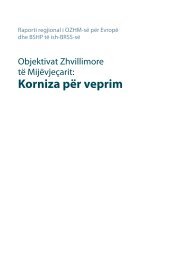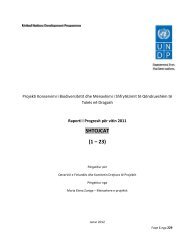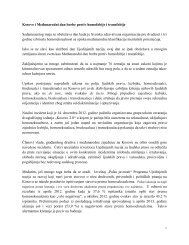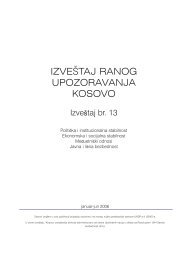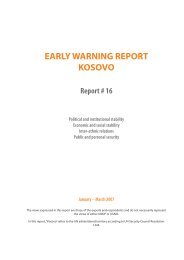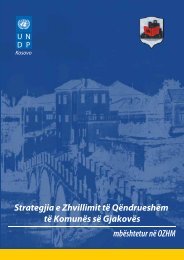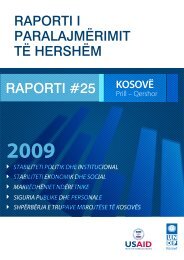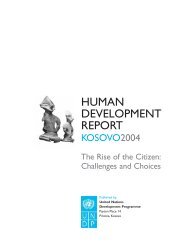Kosovo Human Development Report 2010 - UNDP Kosovo - United ...
Kosovo Human Development Report 2010 - UNDP Kosovo - United ...
Kosovo Human Development Report 2010 - UNDP Kosovo - United ...
You also want an ePaper? Increase the reach of your titles
YUMPU automatically turns print PDFs into web optimized ePapers that Google loves.
5.1<br />
Political participation<br />
and exclusion –<br />
the <strong>Kosovo</strong> paradox<br />
Political participation is a key concept<br />
of both political science theory and<br />
political practice. A basic value of democracy,<br />
it defines the way in which<br />
trust is built and maintained between<br />
governance and the governed. As with<br />
any relationship, political participation<br />
implies active effort – from authorities,<br />
to provide fora for public opinion and<br />
demonstrate political responsiveness,<br />
and from society, to take advantage of<br />
opportunities for political expression<br />
and provide regular feedback, including<br />
at the voting booth. The healthiest<br />
democracies are those in which the<br />
degree of effort is proportionate and<br />
consistent between both sides, and<br />
the widest range of participation is<br />
supported.<br />
Although democracy is, by definition,<br />
the most participatory and representative<br />
of all political systems, it naturally<br />
produces a bias in favour of majority<br />
groups, norms and values. Those<br />
CHAPTER 5<br />
Political participation and exclusion<br />
“Without adequate levels of meaningful<br />
participation and representation,<br />
overall government performance and<br />
accountability will suffer, jeopardizing<br />
the establishment of an effective and responsive<br />
democratic system.”<br />
<strong>UNDP</strong> <strong>Kosovo</strong> <strong>Human</strong><br />
<strong>Development</strong> <strong>Report</strong> 2004<br />
with the greatest platforms for expression<br />
achieve the greatest representation<br />
in government. By definition, majorities<br />
have the most frequent opportunity to<br />
express their views and the greatest likelihood<br />
of generating a response. Inequality<br />
of representation and influence are,<br />
moreover, not “randomly distributed but<br />
systematically biased in favour of more<br />
privileged citizens – those with higher<br />
incomes, greater wealth, and better education<br />
– and against less advantaged<br />
citizens”. 153 This is a potential weakness<br />
of democracy, from the human development<br />
perspective. It requires corrective<br />
action by societies and governments,<br />
in the form of outreach to the socially<br />
weaker – often the poor, religious or ethnic<br />
minorities, people with special needs<br />
and, frequently, women. 154<br />
Where such action is not taken, political<br />
exclusion is the result. As such,<br />
political exclusion and social exclusion<br />
are deeply connected and mutuallyreinforcing.<br />
155 Socially excluded individuals<br />
and communities are less likely<br />
to turn out to vote and to participate in<br />
non-electoral ways in decision-making<br />
processes. 156 Unable to make their voices<br />
heard, and unconvinced that authorities<br />
are interested in their opinions, they sink<br />
out of public debate. They become politically<br />
invisible – last on the list for decent<br />
housing, services, jobs and future prospects.<br />
In this way, nations undermine<br />
their own capacity and potential.<br />
<strong>Kosovo</strong>’s record in this regard is<br />
strangely contradictory. Its legislation<br />
regarding political participation meets<br />
POLITICAL PARTICIPATION AND EXCLUSION<br />
| 77



